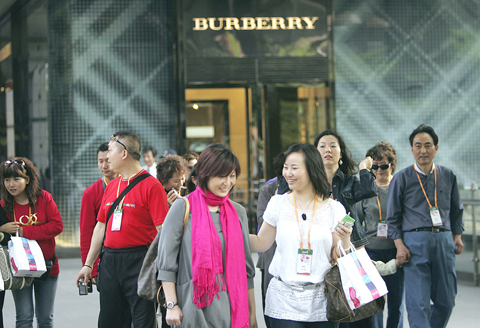A Chinese Nationalist Party (KMT) lawmaker yesterday criticized the behavior of Chinese tourists and local media yesterday, calling the visitors’ behavior while shopping “arrogant,” but slamming the coverage of the tour groups as excessive.
KMT Legislator Huang Chao-shun (黃昭順) told a Transportation Committee meeting that she had been enraged by the detailed coverage of a visit by Amway China employees on an incentive trip to Taiwan. Too much coverage was being given to them, she said.
“I was particularly upset when I saw that, during this period, a Chinese fishery patrol boat was dispatched to the South China Sea and claimed one of the biggest islands in the area as Chinese territory,” she said.

PHOTO: WALLY SANTANA, AP
“Chinese tourists seemed to think they had arrived at a wild frontier where you can do whatever you want,” Huang said, adding that she had seen footage of a Chinese woman climbing on a rock in Taroko Gorge to take a photograph despite warning signs prohibiting such behavior.
She reminded Minister of Transportation and Communications Mao Chi-kuo (毛治國) that the government, in its rush to promote Chinese tourism, should not forget about tourists from other countries. As an example, she said that on one High-Speed Rail trip she took, the business class cabin was full of Japanese tourists.
Democratic Progressive Party (DPP) Legislator Kuo Wen-cheng (郭玟成) was critical of what he said was the outrageous behavior of Chinese tourists. Kuo said that he wanted to curse when he saw TV footage of the Amway group.
“The way they spent was meant to show off … And taking off their shoes while visiting a national scenic area? Come on!” Kuo said, although he did not say specifically where the barefoot incident had occurred.
Noting that the Amway cruise had only stopped at Keelung, Taichung and Hualien ports, he suggested that the group visit Kaohsiung and let the Taiwanese there “teach them some manners.”
Other legislators, however, disagreed with their colleagues’ descriptions of Chinese tourists as “arrogant” or “classless.”
KMT Legislator Lee Hung-chun (李鴻鈞) said seeing the Amway employees reminded him of Taiwanese tourists 20 years ago, who did exactly the same thing when they traveled overseas.
KMT legislators Tsao Erh-chang (曹爾忠) and Chu Fong-chi (朱鳳芝), along with DPP Legislator Tien Chiu-chin (田秋堇), also spoke in the visitors’ defense.
“Would we call someone who spends that much money ‘an arrogant tourist’ if they were from Europe or North America?” Chu said.
Tien said that she had attended an event in Hsinyi District celebrating the 50th anniversary of Tibet’s National Uprising Day and saw a bunch of people across the street watching the event. She said she thought the onlookers were Chinese tourists, since not too many locals had paid attention to the anniversary.
“The visit of Chinese tourists is not necessarily a bad thing,” she said. “If China is aiming to become a great nation, then it has to learn to listen to and respect those with different opinions.”
Responding to the complaints, Mao said that he hoped that the media would treat Chinese tourists like any other foreign tourists.
“The majority of our overseas tourists are from Japan, South Korea and Southeast Asian countries. Tourists from China are only a small part,” he said.
“Some issues have occurred as they [the Amway tour] came in such a large group within a short period of time,” Mao said. “We will try to communicate about these problems with the local travel agencies and tour guides.”

Nipah virus infection is to be officially listed as a category 5 notifiable infectious disease in Taiwan in March, while clinical treatment guidelines are being formulated, the Centers for Disease Control (CDC) said yesterday. With Nipah infections being reported in other countries and considering its relatively high fatality rate, the centers on Jan. 16 announced that it would be listed as a notifiable infectious disease to bolster the nation’s systematic early warning system and increase public awareness, the CDC said. Bangladesh reported four fatal cases last year in separate districts, with three linked to raw date palm sap consumption, CDC Epidemic Intelligence

The manufacture of the remaining 28 M1A2T Abrams tanks Taiwan purchased from the US has recently been completed, and they are expected to be delivered within the next one to two months, a source said yesterday. The Ministry of National Defense is arranging cargo ships to transport the tanks to Taiwan as soon as possible, said the source, who is familiar with the matter. The estimated arrival time ranges from late this month to early next month, the source said. The 28 Abrams tanks make up the third and final batch of a total of 108 tanks, valued at about NT$40.5 billion

Two Taiwanese prosecutors were questioned by Chinese security personnel at their hotel during a trip to China’s Henan Province this month, the Mainland Affairs Council (MAC) said yesterday. The officers had personal information on the prosecutors, including “when they were assigned to their posts, their work locations and job titles,” MAC Deputy Minister and spokesman Liang Wen-chieh (梁文傑) said. On top of asking about their agencies and positions, the officers also questioned the prosecutors about the Cross-Strait Joint Crime-Fighting and Judicial Mutual Assistance Agreement, a pact that serves as the framework for Taiwan-China cooperation on combating crime and providing judicial assistance, Liang

A group from the Taiwanese Designers in Australia association yesterday represented Taiwan at the Midsumma Pride March in Melbourne. The march, held in the St. Kilda suburb, is the city’s largest LGBTQIA+ parade and the flagship event of the annual Midsumma Festival. It attracted more than 45,000 spectators who supported the 400 groups and 10,000 marchers that participated this year, the association said. Taiwanese Designers said they organized a team to march for Taiwan this year, joining politicians, government agencies, professionals and community organizations in showing support for LGBTQIA+ people and diverse communities. As the first country in Asia to legalize same-sex